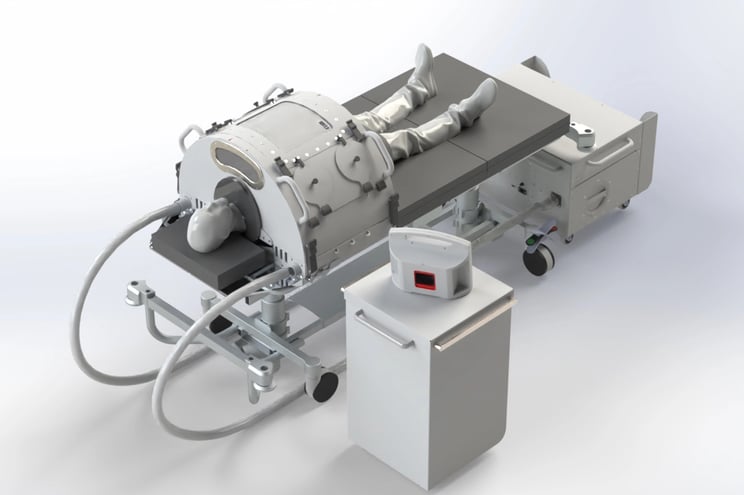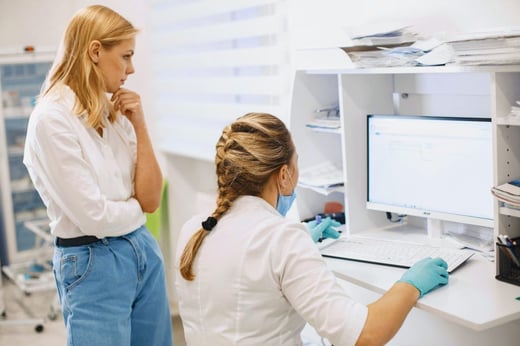
Portsmouth Aviation and 42T collaborate to bring innovative Exovent ventilator to market
October 2023
UK manufacturer Portsmouth Aviation has appointed 42T as a strategic development partner to help bring its unique Exovent negative pressure ventilator (NPV) system to market.
42T will be responsible for the design and development of the control unit, monitoring and alarm system for the new medical ventilator including system hardware, firmware and rigorous regulatory compliance.
.webp?width=717&height=491&name=1%20-%20Exovent%20NPV_patient%20enclosure_IMG0013%20(3).webp) The Exovent Negative Pressure Ventilator (NPV) system is being developed as a convenient, lightweight device
The Exovent Negative Pressure Ventilator (NPV) system is being developed as a convenient, lightweight device
42T’s medical device engineers will then work closely with the development and manufacturing teams at Portsmouth Aviation, along with clinicians from the Exovent charity, to successfully integrate the control system into the ventilator.
The work will comply fully with IEC/EN 60601 standards for the safety and performance of medical electrical equipment, and will involve the development of class C safety-critical software to meet IEC/EN 62304 standards.
42 Technology will play a pivotal role in developing the control system for the Exovent ventilator, and their medical device engineering and regulatory experience will be essential in helping us to advance it into initial production and first clinical trials.
42T's appointment follows a complete review of the development programme and series of improvements that we decided to make to the initial designs for the new ventilator. We have worked closely with the team at Exovent to improve key aspects including the usability and aesthetics of the patient enclosure, noise levels and the seals around the patient.
We have also modified the design so units can be more easily and cost-effectively manufactured using our existing in-house production technologies and teams."
The Exovent NPV system is being developed as a convenient, lightweight device that encloses the patient’s torso from neck to hips. The system allows patients to talk, drink and eat normally while being ventilated, unlike traditional positive ventilator systems where patients need to be sedated and intubated, or wear a mask.
%20(1).webp?width=749&height=500&name=3%20-%20Patient%20at%20Portsmouth%20Aviation%20event_10_1%20(2)%20(1).webp)
Above: Here a patient with lived experience of positive ventilation tests the Exovent NPV system for themselves at a recent Portsmouth Aviation event.
The Exovent NPV system was first proposed and designed by a group of anaesthetists, critical care consultants, medical clinicians, engineers and others who set up a task force in March 2020 in response to the COVID-19 crisis, and inspired by the UK government’s ventilator challenge.
Although the government’s initiative was subsequently disbanded (and they were only looking for innovations in positive pressure devices), the volunteers have continued their mission by setting up the Exovent charity to help raise awareness of the potential benefits of negative pressure ventilation.
The charity transferred its initial system designs to Portsmouth Aviation in 2021, and the Exovent NPV system is now being developed by a strategic partnership between the company and the charity.
Portsmouth Aviation will be the legal manufacturer of the device but will use its subsidiary healthcare company, Illustrious Healthcare Solutions, for marketing and sales.

42 Technology’s appointment follows a series of performance and manufacturability improvements to initial designs for the new ventilator.
Potential advantages of negative pressure ventilation
Positive pressure ventilators (PPV) are widely used in clinical settings, but they come with certain drawbacks that may be addressed by negative pressure ventilators (NPV).
Improved patient comfort and reduced risks: Traditional PPV systems require patient to be sedated and intubated or to have a tracheostomy to bypass the oral-nasal route for breathing. However, PPV systems can reduce cardiac output, potentially resulting in hypotension, and increase the risk of ventilator associated lung injuries or pneumonia due to intubation. NPV, on the other hand, more closely mimics ‘natural' breathing, potentially offering significant clinical advantages. It does not necessitate tracheal intubation and minimises the likelihood of adverse cardiovascular events and barotrauma.
A forgotten life-saving therapy: NPV has been successfully used for over a century across various clinical conditions, including acute respiratory failure in COPD patients and neuromuscular disorders. But it has been largely disregarded since the 1960s with the emergence of smaller positive pressure devices.
More patient-friendly alternative to CPAP: Scientific and clinical studies have indicated that a modern NPV device, particularly one with a torso-only cabinet, could present a more patient-friendly alternative to Continuous Positive Airway Pressure systems (CPAP) that typically require patients to wear a mask.
A non-invasive NPV system could also potentially prevent escalation of a patient's condition, potentially avoiding the need for intubation and mechanical ventilation with a PPV system. For further information see exovent.org.
.webp?width=752&height=813&name=4%20-%20Exovent%20NPV_patient%20being%20ventilated_IMG3%20(1).webp) Portsmouth Aviation will manufacture the Exovent ventilator but use its subsidiary healthcare company, Illustrious Healthcare Solutions, for marketing and sales.
Portsmouth Aviation will manufacture the Exovent ventilator but use its subsidiary healthcare company, Illustrious Healthcare Solutions, for marketing and sales.
Solid track record
42T’s appointment follows an earlier successful project by the consultancy to review the proposed control system architecture for Exovent NPV. This led to a recommended improvement in how the monitoring/alarm system, main controller, pump assembly and user interface (HMI) could be effectively segregated as distinct parts of the system.
The new approach significantly reduces the reliance on safety-critical software, minimises development risks and will ensure a fast-paced development while prioritising safety and security.
Read the case study here
About Portsmouth Aviation
Portsmouth Aviation is a family-run engineering company that has become one of the UK’s leading aviation and aerospace component manufacturers. Over the last few years, the company has been increasingly expanding its range of engineering services and capabilities; targeting new sectors such as oil, gas and marine; and developing its own product ranges.
Earlier this year, Portsmouth Aviation was awarded the Solent 250 ‘Growth Story of the Year’ award for its exceptional year on year growth, its commitment to engineering investment and innovation, and the diversification of its business.
Press coverage
The Engineer: 42T to help bring Exovent ventilator to market
Institution of Engineering Designers: Engineering Designer article
Business Weekly: 42T helps accelerate a move to market for Covid era ventilator
Cambridge Network: Portsmouth Aviation and 42 Technology collaborate to bring Exovent ventilator to market
Hospimedica.com: Unique Negative Pressure Ventilator System to Advance into Production and Clinical Trials
Med-Tech Innovation: Portsmouth Aviation appoints 42T to bring Exovent ventilator to market
eeNews Europe: Medical ventilator heads for production

Find out more: contact our Director of Healthcare, Craig:
craig.townsend@42T.com | +44 (0)1480 309461 | LinkedIn: Craig
Share this article:
Related Articles

Healthcare & Life Sciences
Health Innovation East & 42T host free webinar to help power Net Zero NHS

Healthcare & Life Sciences
Women in STEM: paving the way for innovation in women’s health

Healthcare & Life Sciences
Healthcare webinar: Overcoming bias in designing women's health solutions

What will you ask us today?
We believe in asking the right questions to drive innovation; when we know the right questions, we generate the ideas to answer them.

